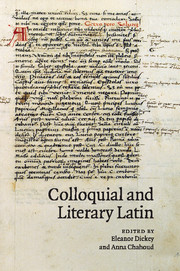Book contents
- Frontmatter
- Contents
- List of contributors
- Acknowledgements
- Foreword (David Langslow)
- PART I THEORETICAL FRAMEWORK
- PART II EARLY LATIN
- PART III CLASSICAL LATIN
- 10 Hyperbaton and register in Cicero
- 11 Notes on the language of Marcus Caelius Rufus
- 12 Syntactic colloquialism in Lucretius
- 13 Campaigning for utilitas: style, grammar and philosophy in C. Iulius Caesar
- 14 The style of the Bellum Hispaniense and the evolution of Roman historiography
- 15 Grist to the mill: the literary uses of the quotidian in Horace, Satire 1.5
- 16 Sermones deorum: divine discourse in Virgil's Aeneid
- PART IV EARLY PRINCIPATE
- PART V LATE LATIN
- Abbreviations
- References
- Subject index
- Index verborum
- Index locorum
12 - Syntactic colloquialism in Lucretius
Published online by Cambridge University Press: 04 April 2011
- Frontmatter
- Contents
- List of contributors
- Acknowledgements
- Foreword (David Langslow)
- PART I THEORETICAL FRAMEWORK
- PART II EARLY LATIN
- PART III CLASSICAL LATIN
- 10 Hyperbaton and register in Cicero
- 11 Notes on the language of Marcus Caelius Rufus
- 12 Syntactic colloquialism in Lucretius
- 13 Campaigning for utilitas: style, grammar and philosophy in C. Iulius Caesar
- 14 The style of the Bellum Hispaniense and the evolution of Roman historiography
- 15 Grist to the mill: the literary uses of the quotidian in Horace, Satire 1.5
- 16 Sermones deorum: divine discourse in Virgil's Aeneid
- PART IV EARLY PRINCIPATE
- PART V LATE LATIN
- Abbreviations
- References
- Subject index
- Index verborum
- Index locorum
Summary
Although (or because?) it is a truism that Lucretius admits colloquial features in his De rerum natura, there are surprisingly few studies explicitly devoted to the language and style of this author, and certainly no book-length treatment exists as we have for a number of Latin poets. Commentators tend to note what they regard as colloquial usages, but are usually not free to pause and justify their assessment. The most substantial single publication on colloquialism in Lucretius to date remains that of Diels (1922), which is concerned primarily with morphological and lexical colloquialism and promises another study on syntactic colloquialism (Diels 1922: 59). Diels did not live to complete it.
Diels's general view was that the instances of colloquialism in Lucretius reflect the language of the farmers around whom the poet supposedly grew up and lived. At the time, scholars disagreed about the extent of the colloquial element in Lucretius' language (see Heinze 1924: 47; Ernout 1923: 155), whereas modern scholars are also likely to question the general explanatory rationale which underlies it. Moreover, it is fair to say that a certain disconnect has become the norm between scholars who are interested in details of Lucretius' language, at least when considered within the context of Latin usage in general and poetic usage in particular, and those who work on Lucretius as a literary or philosophical text and on what one might call his ideological position, whether it is within the didactic tradition, within the intellectual landscape of the Hellenistic period, or narrowly within the Epicurean tradition.
- Type
- Chapter
- Information
- Colloquial and Literary Latin , pp. 203 - 228Publisher: Cambridge University PressPrint publication year: 2010
- 2
- Cited by

